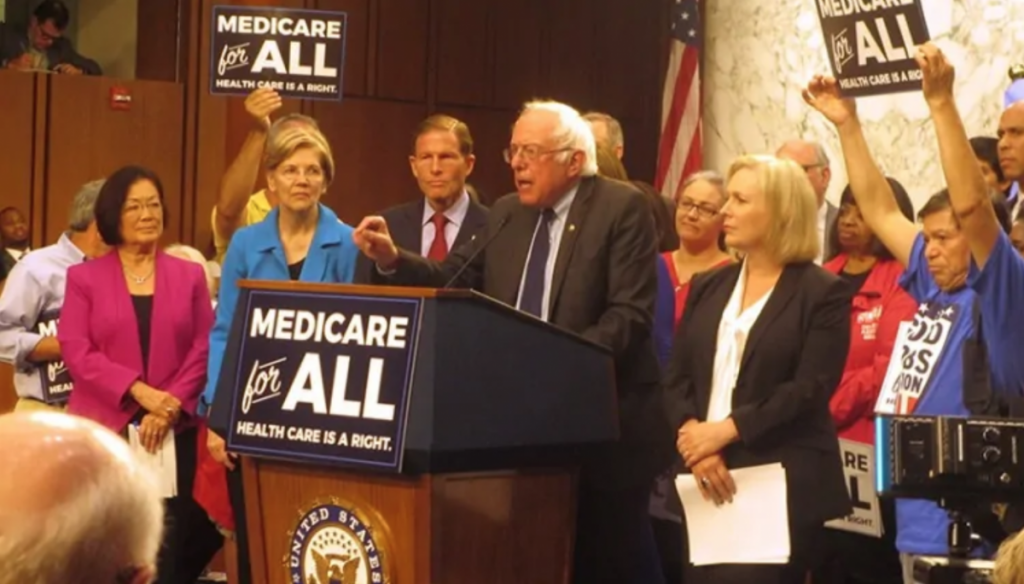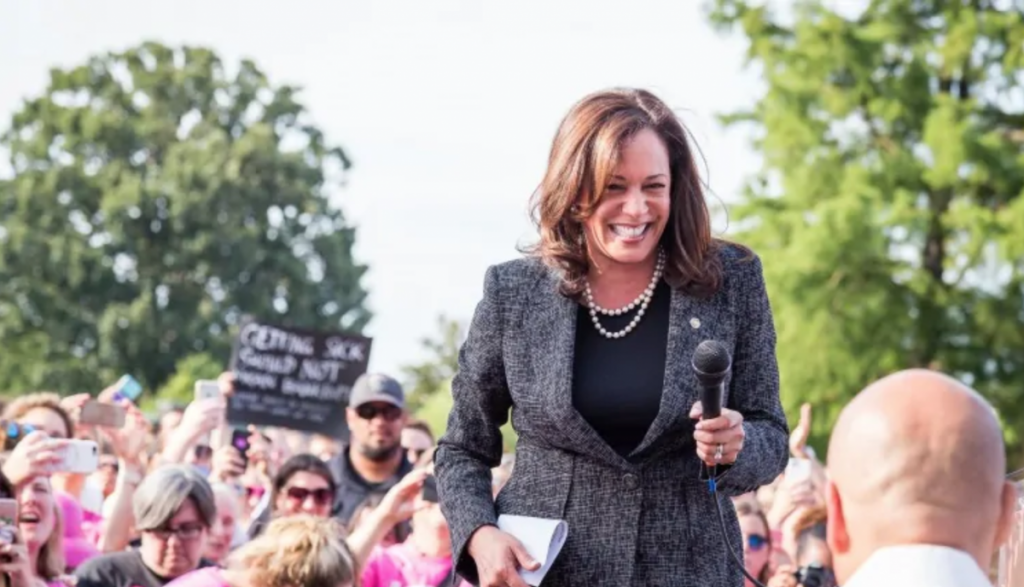The healthcare debate among Democratic candidates highlights a fundamental question within the party about the proper role of government. Rural voters will have a hand in helping determine which direction the Democratic Party takes.
Medicare for All. Medicare for Most. Medicare for Some. Medicare at 50.
Democratic presidential candidates are offering a range of ways to structure a mandatory or optional public health insurance program. With rural voters, the challenge may be creating a policy that goes far enough without going too far.
Fifty-five percent of rural voters favor a Medicare for All plan, according to a July Harvard/Harris poll. But other rural residents, like Iowa farmer Ron Rossman, think a mandatory program would go too far for the rural voters he knows.
Rossman equated Senator Bernie Sanders’ Medicare for All proposal (also supported by Senator Elizabeth Warren and entrepreneur Andrew Yang) with socialism. “With health care and all that, socialism early in my lifetime was associated with communism, and we grew up with all that kind of thinking,” Rosmann told Senator Warren, according to the Chicago Times. “Rural people have long memories.”
Veteran political reporter David Yepsen, host of the “Iowa Press” TV, said Iowa is a good place to see how various healthcare proposals go over with rural voters.
“What you’re seeing here is a good microcosm of an argument going on in the Democratic Party all over the country,” Yepsen told the Chicago Times. “They’ve got to find candidates who can do better in rural areas. Now, do you do that with a moderate message or a more progressive message? That’s still to be determined, and Iowa is a good place for that type of testing ground.”
So what do the various public-option proposals mean?
The plans can be broken down into five different options:
- Medicare-for-all – a single-payer program for all U.S. residents, which would move all Americans to a government-run health insurance program.
- Medicare for America –a national health insurance program that keeps private insurance and would allow U.S. residents opt-out of the national plan with qualified private coverage.
- Medicare-X-Choice – the existing Affordable Care Act altered to offer coverage individuals could opt into.
- Medicare at 50 – Medicare coverage for U.S. residents starting at age 50
- Medicare State Option – a buy-in option approved by individual states that would offer coverage through the Affordable Care Act marketplace.
Since the 2016 election, the idea of Medicare for All, or single-payer healthcare, has expanded to include several other options that would transition the country into a system that allows for expanded healthcare coverage.

Several members of Congress have submitted bills that would reflect these options. Most notably, Sanders’ bill would create a national health care system paid for by taxes that would replace all private insurance, Medicare and Medicaid and Children’s Health Insurance Program, or CHIP benefits. Sanders pointed to the current system as broken and needing to be replaced with something that would provide health care for every American.
“It is unacceptable to me and to many Americans that 87 million people in the United States are uninsured or under-insured,” he said in a policy statement on July 17. “Americans pay twice as much per capita on healthcare than any other country while our life expectancy continues to go down and our healthcare outcomes lag behind other major countries.”
Sanders’ plan is supported by Warren and tech entrepreneur Andrew Yang. (Sanders’ proposal became a flash-point differentiating candidates’ approaches during the September 12 debate.) All three candidates say Medicare for All is the only way to ensure Americans have access to healthcare, and view healthcare as a right, as opposed to an option.
And at a town hall forum on CNN this year, Warren said it would be, and should be, the least expensive option, “What’s key is to get everyone to come to the table on this … and to figure out a way to get medical coverage for everyone at the lowest cost possible.”
For Yang, the issue is one of ensuring that the healthcare system is working for Americans and not bankrupting them even if they have insurance.
“Access to quality healthcare is one of the most important factors in overall well-being, and yet America is one of the few industrialized nations not to provide healthcare for all of its citizens,” Yang’s campaign website says. “Through a Medicare for All system, we can ensure that all Americans receive the healthcare they deserve. Not only will this raise the quality of life for all Americans, but, by increasing access to preventive care, it will also bring overall healthcare costs down.”
Other candidates support a Medicare for All option, but also would support rethinking the whole healthcare system in America. These candidates vary wildly in their support of alternative pieces of legislation, and other ideas for the system. Some advocate lowering the age for which Americans qualify for Medicare to 50. Others say individuals and companies should have the option to buy into Medicare.

Senator Cory Booker (D-NJ) and Kamala Harris (D-CA) have endorsed many different plans.
On its website, Booker’s campaign said “Cory believes that health care is a human right and that Medicare for All is the best way to safeguard that right for every American. On the path to Medicare for All, we must act with urgency for people across the country who need quality, affordable health care. This plan will immediately address one part of the broken system as we move toward guaranteed health care for all Americans.”
But his stance has also been that he supports all the legislation previously introduced, and would be willing to entertain systems that provide Medicare for Most.
Harris said on her web site a new healthcare system should be based on the current Medicare system, as it’s a system that’s accessible for all Americans.
“Kamala’s plan for Medicare for All expands on the progress made under Obamacare, immediately offers an improved Medicare buy-in, and transitions the country to a Medicare system we are all in so that we can take on insurance and drug companies. Her plan will reduce costs, keep options for public or private Medicare plans, and ensure a smooth transition,” her campaign said on its web site. “Medicare works. It’s popular. Seniors transition into it every day, and people keep their doctors and get care at a lower cost. Let’s not lose sight that we have a Medicare system that’s already working.”
South Bend, Indiana, Mayor Pete Buttigieg said he would like to see a “Medicare for All Who Want It” plan.
“The health care system we have today is both unjust and inefficient. For the first time since World War I, life expectancy is falling. If you’re uninsured, you’re paying too much for health care. If you’re insured, you’re still paying too much. This burdens hard-working families, especially in communities of color, the most. Other developed countries provide universal coverage for less than what Americans currently pay — and with better results. The American people should not have to settle for less,” Buttigieg’s campaign said on its web site. “This plan makes a Medicare-type public option available on the exchange and invites people to buy into it: if corporate insurers don’t lower costs to deliver something dramatically better than what is available today, competition will create the glide path toward Medicare for All.”
Former Housing and Urban Development Secretary Julian Castro said that while he supports Medicare for All, he doesn’t think we should eliminate private insurance completely, instead giving Americans the option to buy into Medicare or private insurance if they choose to do so, depending on what the final system is the winner. Castro hasn’t specifically endorsed any of the options presented as solutions to healthcare coverage, but has said that he feels healthcare should be a right for Americans.
Beto O’Rourke, the former Texas Representative, said that he would support Medicare coverage through private insurers, as well as allowing people the option of buying into Medicare.
“We need universal, guaranteed, high-quality health care so that every single American is healthy enough to go to school, work a job, start a business, raise a family, and live up to their full potential,” O’Rourke’s campaign said on its website. “Each day that we fail to deliver on that promise is another day that Americans will be forced to split their pills, to postpone seeing a doctor, to make the impossible choice between paying rent or paying their premiums. Beto’s plan would dramatically reduce out of pocket expenses and eliminate deductibles for Medicare participants—and it would ensure everyone who wants to enroll in Medicare can do so, without eliminating employer-sponsored insurance. That’s because Beto believes health care—including reproductive and mental health care—is a right, not a privilege.”
The last of the three candidates who debated on September 12th has supported keeping the Affordable Care Act as a way to provide more healthcare coverage to Americans.
Former Vice President Joe Biden said he supports taking the existing law and fixing it as a pathway toward universal coverage.
“Because of Obamacare, over 100 million people no longer have to worry that an insurance company will deny coverage or charge higher premiums just because they have a pre-existing condition – whether cancer or diabetes or heart disease or a mental health challenge. Insurance companies can no longer set annual or lifetime limits on coverage. Roughly 20 million additional Americans obtained the peace of mind that comes with health insurance,” Biden’s campaign said on its website. “As president, Biden will protect the Affordable Care Act from these continued attacks. He opposes every effort to get rid of this historic law – including efforts by Republicans, and efforts by Democrats. Instead of starting from scratch and getting rid of private insurance, he has a plan to build on the Affordable Care Act by giving Americans more choice, reducing health care costs, and making our health care system less complex to navigate.”
Senator Amy Klobuchar (D-MN) agreed.
“Amy supports universal health care for all Americans, and she believes the quickest way to get there is through a public option that expands Medicare or Medicaid. She supports changes to the Affordable Care Act to help bring down costs to consumers including providing cost-sharing reductions, making it easier for states to put reinsurance in place, and continuing to implement delivery system reform. And she’s been fighting her whole life to bring down the cost of prescription drugs,” her campaign said on its website.
While the plans vary, most all of the major candidates agree that medical insurance coverage for all is an important issue that must be addressed by the federal government.
This article was originally published by The Daily Yonder.



